Politics
OPTIONS FOR CHANGE IN THE CATACOMBS OF CATASTROPHE
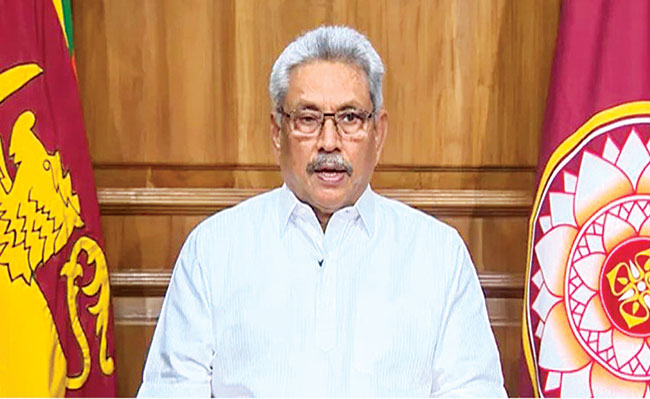
by DR. DAYAN JAYATILLEKA
The simplest way to understand the crisis that Sri Lanka finds itself in is to understand it as if this country were an individual. It is the story of a middle-class person who had a gambling habit and has found himself on the street, a bum, begging for handouts, unsure when his next meal is or where it might come from. To make this story more accurate, Sri Lanka is a teenager who enjoyed a middle-class life whose family was bankrupted because his father was a gambler and a lousy one at that.
From where might salvation, liberation or even simple improvement come? Still more modestly, who and what might enable the country to hit the brakes before plunging over the abyss and into freefall?
GOTA HELL
We can rule certain things and people out. We cannot expect solutions from the country’s leader President Gotabaya Rajapaksa, because he kicked us into the deepest socioeconomic pit in our history since Independence. He was, if one may borrow Tina Turner’s lyrics, “simply the best/better than all the rest”.
Gota is taking two steps back and one sideways, for every step forward that he takes –such as canceling out by his Bloomberg interview and recent conduct, his address to the nation and pledge of the reintroduction of the 19th amendment.
Most damning of all, the ridiculousness of his initial, foundational assumption that he was insured by China and therefore could commit any economic craziness that caught his fancy and also proceed to dismissively discriminate against China (the highway tender), has now been revealed. Gota just doesn’t have what it takes to make rational evaluations and judgments.
Why doesn’t he phone President Xi, the “governance policy” of whose Communist Party he wanted to learn, thank his for the birthday greeting and ask him for a bailout? Better still, why doesn’t he fly to China, cap in hand? Mrs. Sirimavo Bandaranaike had that kind of equation with Premier Zhou Enlai, to the extent that she never had to ask, he just brought it up in official conversation, recorded it in an official letter and handed her a very large cheque (1971).
Gotabaya Rajapaksa doesn’t know that he has a near zero-chance of achieving his stated intention of making it to the end of his term. The mass mood is such he may not even be able to make it to the end of the year.
He should have realized that the only way in which he could have lasted even half of the rest of his term, or even limped to the end of it, was to speedily divest himself of power by means of a robust—not diluted–21st amendment, transferring it to a diversity of democratic institutions while retaining only the power which a broad political consensus allowed him to, thereby reducing his target profile.
Gota has now given himself only one exit, because he has presented the citizenry with only one way to be rid of the source of their unprecedented suffering—and that is the way that autocrats from the Shah through Marcos to Suharto went.
SIRISENA AND/OR DULLAS?
The way to go should be readily obvious to the SLPP (‘Pohottuwa’) that unless it wishes to be buried electorally, politically and perhaps literally, under the rubble of the Gotabaya presidency when it falls, which it will, sooner than later.
When a social crisis was growing in the 1950s which erupted in the Hartal of 1953 and the so-called silent Revolution (with its Sinhala Only downside) in 1956, SWRD Bandaranaike broke away from the UNP and founded a new, center-left party. The solution therefore came from within, but through a rupture.
As I had noted in 1995 in my first book, Sri Lanka in 1988 faced a combination of all three types of crises a state can face: (a) an anti-systemic civil war in the south generated by governance and socioeconomic grievances, (b) a secessionist civil war in the northeast generated by ethnoregional/ethnolingual grievances, and (c) a foreign military presence on part of the island’s soil. The solution came from within the ruling party: Prime Minister R Premadasa who was readying his independent candidacy and campaign structure when he was given UNP nomination, accepted the challenge of a “torch blazing at both ends”, ran against the odds and won.
When Sri Lanka had failed under five presidents (JR, Premadasa, Wijetunga, Chandrika) to defeat the Tigers who were pounding Colombo with suicide bombers and truck bombs, while waging mid-intensity large unit warfare in the island’s northeast, Mahinda Rajapaksa rose to the challenge and prevailed. He was the ruling party’s candidate.
Is there anyone in the ruling party or the (now fractured) ruling coalition of 2019-2020 who might play a pale version of the role of these unconventional figures who arose within the establishments of their day? I can think of only two personalities, each one capable of bringing some talented players with them, and if they combine forces, could amount to something significant. One is ex-President Maithripala Sirisena, the other Dullas Alahapperuma (ably supported by Dr Charitha Herath and Dr Nalaka Godahewa, two sharp policy minds in parliament). But do they have what it takes? If so, they should surely manifest it at this late stage.
Much will depend upon whether this progressive tendency will crystallize soon enough to make an impactful intervention in the crisis, and whether it will succeed in creating an ‘ensemble’ –or as General de Gaulle called it, a “rassemblement”, a “rally” — of center-left forces, involving the SLFP and its leader, ex-President Maithripala Sirisena, and the nine smaller allies.
Former President Sirisena who successfully piloted the 19th amendment through, stitching together a two-thirds majority for it, knows from experience what the defects of 19A are, and has presented his party’s ideas for constitutional change to the experts’ committee drafting a new Constitution, should convene an all-parties roundtable to hammer out a compromise that can get the 21st amendment (building on Wijayadasa’s) 150 votes.
PRIME DONNA-ISM & POLITICS
Politics is intervention. Let me record and reiterate my criticism of the non-acceptance of the Prime Ministership by Opposition leader Sajith Premadasa. My criticism stems from my understanding of political responsibility and opportunity in a situation of grave national crisis. In his autobiography, the philosopher Louis Althusser reminds us of what is vital in serious politics focused on state power and making history:
“…to seize the opportunity, the ‘chance’ as Machiavelli describes it… ‘the precise moment, the opportunity’ (Lenin) ‘have to be seized with both hands’ (Machiavelli, Lenin, Trotsky, Mao), since they may only last a few hours. Once they had gone, and with them the chance to change the course of history…”. (Althusser, ‘The Future Lasts a Long Time’, pp. 229-231)
There is a major move that the Opposition Leader can make. Convene a National Roundtable of the best economists and public policy experts in the island, discuss and debate in continuous session to a finish (over a weekend) and present to the Parliament and the public the Plan for the rescue of Sri Lanka. In the recent past the main Opposition has only been negativistic but it must now be creative and constructive.
All said and done, it must be recognized that the SJB and JVP are the only two cohesive, compact political parties and therefore, crucial change-agents. Whether or not they will prove decisive change-agents is another matter.
AUDIT ARAGALAYA 1.0
In terms of strategy and tactics, the JVP-JJB, the FSP-IUSF and the Aragalaya must have the courageous lucidity to admit the monumental blunder of the second half of May 9th. Let’s leave the rights and wrongs, the good and bad, the ethics and morals aside. Look at the balance of forces in the concrete situation.
Gotabaya Rajapaksa was far worse off on the night the light-show was projected on the walls of the Presidential Secretariat, than when he woke up on May 10th morning. After the night of May 9th, Colombo woke up to effective military deployment on the streets and a shrunken Aragalaya. Society was shaken by the violence and relieved by the military presence. It wasn’t only Mahinda Rajapaksa who blew it on May 9th. He did so in the morning; Gotabaya’s opponents did so from the afternoon till the next morning.
So far, the discourses of the civil society liberal-legalists, the main Opposition (SJB), the Left (JVP, FSP) and the Resistance (IUSF, Aragalaya 2.0) – “abolish the executive presidency”, “all 225”, “74 years” –remind me of nothing so much as the famous phrase of the Swiss founding father of cultural history, Jacob Burckhardt: “terrible simplifiers” (“les terribles simplificateurs”).
SOCIALIST SOLUTION?
The economy is ‘the real foundation’ (Marx) of society upon which politics and other levels of the superstructure spring. The economic factor is not the dominant factor every time in everything but is ‘ultimately’ or ‘in the final analysis’ the ‘determinant’ factor. The crisis of the Sri Lankan economic ‘foundation’ is so intense and all-encompassing that the we are living in ‘the final analysis’. The political ‘superstructure’ cannot but undergo transformation commensurate with the character and scope of the crisis.
Sri Lanka’s crisis is not a crisis of capitalism but rather of Gota Chinthanaya, and as such does not require a “system-overthrow” as the radical left would have it, but if the crisis and dysfunctionality of Sri Lanka’s capitalism has metastasized, and cannot be attenuated before people start dying of poverty, hunger, ill-health and cannibalistic violence over scarce resources; if our political class has failed us, then it may take a conversion to some form of socialism, merely to become functional again.
Left leadership also requires educating the masses that class consciousness is not social resentment.
The sheer survival of Sri Lanka as a society, a community and a people, and the preservation of Sri Lanka as a State in the world, is more pressing and more fundamental than the form or mode it takes, be it liberal-democracy or capitalism.
CHANGE-AGENT
But what will be the decisive agency of change? Who will bell the cat?
Peter Youssuf, a member of Iraq’s Christian minority, a former member of the Iraqi Communist Party’s Central Committee who had been in jail for 22 years, broken jail on eight occasions and was the Editor of the ruling Ba’ath party newspaper Al Thawra, was escorting my father and our family on our visit to Iraq as guests of Tariq Aziz, Information Minister and Foreign Minister (later executed during the American invasion and occupation of Iraq).
Peter Youssuf and my father Mervyn de Silva (who died 23 years ago this week) were debating the question of “what is the decisive factor in a political crisis?”. Though I was a teenager at the time, I’ve never forgotten Peter Youssuf’s emphatic answer in the cold night air in the Iraqi desert: “In the final analysis, what is decisive are the men with the guns, and the men who control the men with the guns.”
Features
A National Sweep from Point Pedro to Point Dondra

by Rajan Philips
More than the actual numbers, it is the extent of the NPP’s sweep, from north to south and from west to east that is truly historic and stunningly remarkable. There is nothing to analyze here. The National Peoples’ Power (Jathika Jana Balawegaya) has led and won the most number of seats in 21 of the 22 electoral districts, with the sole exception of Batticaloa where the NPP is placed second after the ITAK.
And of all places, the NPP has won the Polling Division of Jaffna, which is the old Jaffna City electorate that in its heyday was represented by Sir Arunachalam Mahadeva in the old State Council before 1947 and by the great GG Ponnambalam QC in the new parliament for 13 years after the 1947 elections. This is not the time for political prognostications, but the symbolism of the moment should not be missed. And the moment is nothing but the clear voice of the Tamil voters indicating their openness to change and their clear message that they are not some ponies for a political derby orchestrated by diaspora funding.
Nationally, the NPP has secured 159 seats, 141 electorally and 18 from the National List. It is a two-thirds majority that should be more humbling than arrogating. President AKD has struck the right note and tweeted, in all three languages, “Thank you to all who voted for a renaissance!” Renaissance, indeed!
On the other side, it is a humiliating rout for the opposition. The SJB is a distant second with 40 seats, and every other party reduced to single digits – the ITAK getting eight seats, Ranil’s New Democratic Front gathering five (much better than the UNP in 2020), and the once almighty SLPP and the ever supple SLMC reduced to three seats each. An assortment of seven solitary winners bring up the total to 225.
When Anura Kumara Dissanayake won the presidency in September with 42.3% of the vote, some pundits started calling him a ‘minority president.’ There is no such entity. The people have now answered the pundits with their clear verdict – 61.6% of the vote and 159 out of 225 seats. Yes, the voter turnout was lower at 69%, but still among the highest in the world. The people have voted in larger numbers for the NPP in November than they voted for AKD in September – from 5,634,915 to 6,863,186, a clear 1.2 million increase.
On the other hand, voters have turned away from Sajith/SJB and Ranil/DNF between the two elections. Sajith Premadasa polled 4,363,035 (32.8%) in September while the SJB could attract only 1,968,716 (17.7%) on Thursday, even fewer than the 2,771,984 (23.9%) votes SJB got in the 2020 parliamentary election. Ranil Wickremesinghe and the DNF have surged downward: from 2,299,767 (17.3%) in September to 500,835 (4.5%) in November.
The ITAK (Ilankai Tamil Arasu Kadchi, the good old Tamil Federal Party) also garnered a lower number of votes and seats in 2024 than in 2020 – from 327,168 votes and 10 seats to 257,813 votes and eight seats, Frontline parliamentarian MA Sumanthiran is a noted casualty in the Jaffna District.
So much Newness
Sri Lanka elected a new president on September 21. Now it has is elected a new parliament, and more than half of them are first time MPs. Within days there will also be a new cabinet – a fully fledged cabinet unlike the cabinet of three that took care of the affairs of the state and government between the two elections. All the elected bodies of the national government are new at the same time.
There has never been so much newness at a single time in the 93 years of our electoral history after the introduction of universal franchise and the election of the first State Council in 1931. Most of us, including all those newly elected, were not born then. Not even Ranil Wickremesinghe, the condescending wise owl of Sri Lankan politics in the 21st century. But the voters have gotten used to his wisecracks, learnt to laugh at his jokes, and ignore his politics.
With plague on all the old political hands, the people opened up to the NPP for a breath of fresh air in September. Now they have given it a full blast. That places quite a burden of responsibility on the new President, the new parliament, and the new government. They don’t have much time for a slow learning curve, or too long a runway for making actionable decisions. They have to run as they learn and learn as they run.
There was much talk about too many elections too soon. In fact, two elections too many. This has been the case since 1977, but no one has done anything about it for 47 long years. Things were fine for the preceding 30 years from 1947 to 1977 when there was only one parliamentary election every four or five years (except in 1960 March and July), and the people directly knew whom they were voting for and electing.
Now there are only lists for each district and the infamous national list. We know how many seats different parties have won but the faces of those who will be taking those seats are yet to be seen. Add to that the new faces who will be coming to parliament for the first time.
It is time that the country reverted to the old system where the voters can see the faces of candidates as they run to get past the post. With an added mechanism to ensure proportionality between the votes garnered by each party and the seats they are assigned in parliament. It is not that difficult except for the vested interests (spearheaded by Ranil-Rajapaksas) who wanted the lists system to continue to maximize the returns on their corrupt political investments. They are all gone now. No need for individual political obituaries.
It is time too to revert to the old parliamentary system and end the direct election of the head of state. President AKD and the NPP are fully committed to making this reversion and the people have mightily endorsed it. The time for debate is over and the time for delivery, if not deliverance, has come. It is a matter of implementing change with maximum responsibility and minimum fuss.
New Parliament, New Cabinet
The challenges facing the new president and the new parliament are enormous. But they are not insurmountable. The first steps that they will be taking in the next few weeks will be watched for signs and signals by well wishers and detractors alike. These steps will involve how the new, large class of 155 MPs are oriented to their new life and its tasks and responsibilities. Thankfully, there will be no ragging. There are not many seniors left to rag anybody anyway. And all the rogues of old have been sent packing.
In other jurisdictions and countries, civil servants prepare binders of instructions and offer presentations for incoming legislators and governments. I am not sure if there is such a practice in the Sri Lankan parliament. In any event, there may not have been a need for such an exercise over the last 24 years when the same old rascals kept coming back in spite of their ignorance and irresponsibility.
Now, with new kids on the block there is opportunity to start with a clean slate and supplemented by instructions on parliamentary procedures, legislative process, financial accountability, and the general roles and functions of MPs and ministers. It would be a worthwhile task that will set the mood for the months ahead.
Educating MPs is boring stuff for political watchers who will be all eyes on who is getting in as ministers in President AKD’s full cabinet. Apart from outside busybodies, it is crucial for AKD and the NPP to get their first cabinet right. We do not know much of the internal JVP/NPP politics that will influence cabinet making, but it is safe to say that AKD and the NPP are uniquely placed to create a cabinet based on secular factors (abilities and qualifications), as opposed to a-secular considerations (family, caste, region, and religion) as well as the co-opting of individual for ethnic representation.
In almost all cabinet making in the past more than necessary deference was given to a-secular factors and co-option considerations. President AKD and the NPP have a historic opportunity to break with this tradition in substantial ways. We will see how much of a break is being achieved when the new cabinet is announced. The cabinet composition will also be scrutinized for its alignment with the NPP’s policy objectives and the countries priorities.
In other words, what will the make up of the cabinet say about the NPP’s approach and its ability to manage the economy, exorcise corruption, maintain essential supplies at affordable costs, reform the educational and health and transport services, and deliver on its promise of a new constitution. There are lessons that could be drawn from past cabinet compositions to find out – both what to do and what not to do.
From 1947 to 1977, the core composition of the cabinet has been the same. The portfolios associated with economic development included finance, land and agriculture, trade and commerce, industry and fisheries. The 1965 UNP government under Dudley Senanayake introduced a new portfolio for Nationalised Services, and a new focus on tourism and foreign exchange albeit in the Ministry of State with JR Jayewardene as the Minister. The 1970 United Front government introduced Plantation Industries as a new portfolio to look after what were then Sri Lanka’s primary export products – tea, rubber and coconut. The portfolio of housing was also introduced to address the urban housing problem.
Even after 1977, with the switch to the presidential system, President Jayewardene maintained the same cabinet composition. As the first head of state and head of government, he assigned himself only three portfolios – defence, economic planning, and higher education. The purpose of including higher education was to implement his idiosyncrasy for privatizing education in general.
But that is not my point here, the point is that he limited his cabinet assignments to a minimum, similar to the two portfolios – foreign affairs and defence – that were assigned to the Prime Minister under the Soulbury Constitution. JRJ even dispensed with foreign affairs; perhaps that was more a snub to the exuberance over non-alignment of his predecessor, Mrs. Bandaranaike.
President Premadasa continued the practice of limited presidential portfolios, although included housing as his portfolio and turned what was an urban problem into a national urgency. He made one significant change and assigned finance to his prime minister, DB Wijetunga. That was the beginning of the end of finance being the single portfolio of one individual minister.
Ironically, it was Chandrika Kumaratunga, the first person who was elected president to abolish the presidency, who opened the floodgates for presidential portfolios. She grabbed finance quite unnecessarily, and assigned to herself (if I am not mistaken) almost a dozen other small and large portfolios. Mahinda Rajapaksa took self-assignments and cabinet expansion to another level, and although there was an attempt to limit this prodigality in the 19th Amendment, what CBK started returned with vengeance under Ranil Wickremesinghe as caretaker president.
It will be revealing to see how President AKD assigns himself portfolios. Actually, the President doesn’t have to be in charge of any portfolio. Unlike the traditional Prime Minister, the Executive President is not the first among equals. He is more than a cut above all the other equals. He has the power to oversee and co-ordinate the functions of all his ministers.
Given the government’s and the country’s priorities, he may want to set up cabinet sub-committees for special areas – for example, export promotion, and preside over them. He could assign himself the portfolio of constitutional affairs to preside over the liquidation of the executive presidency. Beyond that, he should leave all other portfolios including finance to other ministers.
Features
Trump and AKD: the vital differences

By Krishantha Prasad Cooray
The people of the United States of America elected that country’s 47th president on November 5, 2024. Donald Trump, who had served as the 45th president and was defeated by Joe Biden, made an unprecedented comeback, securing 312 votes of the electoral college. It left those who backed his main opponent, Democratic Party candidate and serving Vice President, Kamala Harris, in shock. After all, Trump was convicted on 34 felony counts of falsifying business records in May in New York and is currently facing charges of fraud, election subversion, and obstruction.
How on earth did he even get on the ballot? How on earth did he win? Are those who voted for him ignorant of his criminal record? Have they forgotten how he covered himself in ignominy in the aftermath of losing the 2020 election? These are the questions that his detractors ask.
Three weeks before Trump’s incredible comeback, at the other end of the planet, a far less known individual created history by becoming the first president to be elected who did not belong to established political formations that have exclusively ruled the country since 1948.
Who on earth is Anura Kumara Dissanayake of Sri Lanka? Where did he come from? How on earth did this man, from the backwoods of the North Central Province trump political dynasties whose birthright it has been to govern the country? Why on earth did the majority of voters pick an untried and untested individual from a coalition formed recently?
How did the leader of a Socialist party, the Janatha Vimukthi Peramuna, better known by its acronym, JVP, lift the paltry 3% share of the vote that the JVP-led coalition, National People’s Power (NPP), obtained in 2020 at the General Election, to 42.31% just four years later? How did the NPP push Sajith Premadasa, leader of the Samagi Jana Balavegaya (SJD) to second place (32.76%) and the sitting president and five-time Prime Minister, Ranil Wickremesinghe of Sri Lanka’s ‘Grand Old Party,’ the United National Party (UNP) to a distant third place with just 17.27% of the vote?
The above questions indicate incredulity of the same order as evident in the in-shock responses of Trump’s detractors. The reasons are strikingly different, though.
Anura Kumara Dissanayake, or ‘AKD’ as he is commonly referred to, is not in-your-face like Trump is. He was not born with the proverbial silver spoon in his mouth. He cut his political teeth when he was still a schoolboy, joining the student wing of the JVP following antipathy to the controversial Indo-Lanka Accord signed in 1987. He survived the violent political upheavals of the late eighties and worked his way through the ranks of the JVP to become the leader of that party in 2014 and of the JVP-led NPP in 2019.
The NPP was then a fringe party in Sri Lanka’s democratic political firmament; AKD got just 3.16% of the votes cast. In the following year, the NPP secured 3.84% of the vote, winning just three seats in the 225-seat parliament. Today, with the party leader just having won the presidential election, the NPP is widely predicted to win a majority of seats on offer at the General Election which will be held on November 14, 2024.
Now AKD is not the first ‘outsider’ to ascend the presidency. Sajith Premadas’s father, former president Ranasinghe Premadasa, did not hail from Colombo’s elite classes and neither did Maithripala Sirisena or even Mahinda Rajapaksa for that matter. All three, however, came up the ranks of one of the two major political forces in the country. They weren’t ‘elite’ but were cosy with the elite. They were at worst tolerated but more typically accepted as safe options in reduced circumstances.
In contrast, AKD is quite an incredible story and the incredulity is not misplaced, even among those who are not aligned with any of the major political parties or coalitions that ruled the country for 76 years. It’s incredible because traditionally, when governments have slipped and become unpopular, the voters have opted for ‘the other party,’ apparently forgetting that they had also squandered opportunities, re-interpreted mandates and were accused of corruption and incompetence. They have, nevertheless, reinvented themselves, often using a new face to represent the party.
On September 21, 2024 a significant number of Sri Lankan voters broke with tradition. Decades of economic mismanagement compounded by the pandemic led to the country becoming bankrupt in 2022. The resultant political chaos in part caused by unprecedented protests saw Ranil Wickremesinghe, the single parliamentarian of the UNP, being elected President by a parliament in disarray.
Indeed his rise ought to be considered even more incredible than that of AKD. His unceremonious eviction in September was already on the cards. Widespread defections to the SJB, which had broken away from the UNP in 2020, meant that Wickremesinghe had no political machine to talk of. The rank and file had abandoned him. He had, to his credit, brought about a semblance of economic recovery but that was just not going to be enough.
AKD and the NPP had diligently done the painstaking groundwork for the transition that began in September. The people themselves had had enough of power transferring from one set of incompetent rogues to another. Those who simply could not envisage an ‘outsider’ becoming president were naturally shocked.
How on earth? Why on earth? These are the questions they ask. But that’s not all. It is clear that the ruling classes are not just livid at the outcome but are palpably jittery about the consequences. Sri Lanka has witnessed on many occasions regime change that has left those who have either bent rules or got them bent, untouched. Such individuals have never been under any threat. There were always ‘friends’ who would take care of them. They survived. They prospered. They were the untouchables. It seems that their insurance policies have expired.
They can’t take it and they will not take this ‘affront’ lying down. AKD has been in office just over a month, but already he’s being charged with not fulfilling election promises. He doesn’t have the privilege of the typical period of grace accorded to the newly elected. He is vilified mercilessly.
AKD’s detractors talk about the long history of the JVP. They allude to the two failed insurrections, one in 1971 and the other in the late eighties.
The JVP’s history is not squeaky clean, clearly, but bloody as those insurrections were, the hands that quelled them were far more bloodied than those of the young people who had erroneously decided that armed struggle was the one option that remained. But wait, AKD wasn’t leading those struggles. He was an infant way back in 1971 and in the late eighties was hardly out of his teens. His political journey began in earnest after all that was done and dusted.
He has acknowledged the errors of his predecessors and the JVP and, like his fellow party members, conducted himself with dignity and a kind of civility observed only in the breach by his political opponents, both in and out of parliament.
His detractors correctly point out that he has no experience in governance. Well, he was briefly a minister twenty years ago when the JVP aligned itself with the then ruling United People’s Freedom Alliance (UPFA) but that doesn’t really count. On the other hand, there is the valid response, ‘what have the so-called experienced people delivered?’
The signs are clear. First, by breaking the confines of a doctrinaire Marxist party and working to create a broader coalition of like-minded individuals and groups, and, as importantly, actively seeking the advice of experts from all walks of life including the corporate sector, AKD has demonstrated that he is willing and able to listen, respect and embrace pragmatic ideas. He has not rocked any boats, except of course the vessels that have carried the corrupt and inefficient to personal and familial ‘greatness.’
AKD and the JVP have abandoned the Marxist label and attempts to make it stick will simply not work. Very few who voted for the JVP were neither Marxists nor even identify the NPP as a left party. Outside of party diehards, the vast majority simply accepted the NPP as a clean party that had the political will to do longed for clean-up.
AKD and the NPP did not ascend to power in ideal times but that’s not atypical. Such political formations emerge from time to time when it is clear that the tried and tested have fallen short and have failed the tests. They will make their mistakes and indeed have actually said that they are aware that they aren’t perfect. They have also said they will learn and learn fast.
Will AKD and the NPP make a difference? Will Donald Trump be a different president this time around? Time will tell. The chances are that Trump will remain the loud-mouthed know-all that he has always been; AKD is most likely to remain the humble village lad who fervently believes that his countrymen deserve the dignity and dignified existence they have been denied for over seven decades.
Features
A brief electoral review of the new and improved United States of Amnesia
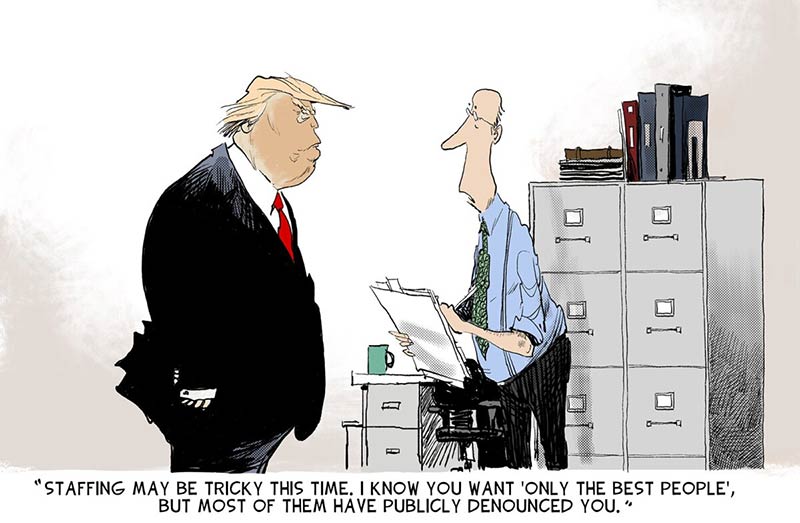
Trump’s proposed cabinet appointments short on quality, long on slavish loyalty
by Vijaya Chandrasoma
Last week, in the despair I felt in the aftermath of the election to the US presidency of the most evil man in the United States, I wrote that I will take a break to lick my wounds and get over my distress at the apparent catastrophe that has befallen my second home. Then I realized that this is not the end of the world, though it sure felt like it on the morning after the election.
I learned that I was not alone in these feelings of despair. Trump’s win had sparked off an unprecedented increase in Google searches reflecting a growing interest among Americans in relocating to foreign countries, New Zealand heading the list with an astonishing 7,600% increase! The next most popular Google search was “the least painful way to kill yourself”.
I have since regained my perspective, and will continue to take the liberty of inflicting my regular brand of “misinformation”. To paraphrase the words of the great Dr. Martin Luther King Jr, the arc of the moral universe is long, but it will hopefully keep bending towards justice. Admittedly, the election of Donald Trump has served to lengthen the arc of the universe way beyond our lifetimes, perhaps even break away from the traditional definition of justice.
Many great countries in the world, Russia, China, North Korea, to name a few, have been following alternative, totalitarian ideologies of governance in the post-World War II era. However, the United States has always been the leader, the beacon of democracy, the example for the “Free World” and many developing countries to pursue the concepts of freedom, the rule of law and the government of the people, by the people, for the people. The justice at the end of the moral arc of the universe.
The constitution of the United States of America in 1789 is recognized as the harbinger of this Great Experiment of Democracy at a time when the world was largely ruled by monarchies and other feudal and totalitarian systems of government.
The overwhelming success of Trump’s Republican Party marked yet another, perhaps terminal phase, in the continuing saga of the Great Experiment of Democracy. Some dregs of the evil breed of white supremacy and ethnic purity seem to have survived the defeat of Hitler and the Nazis in Germany in the 1940s. The ultra-right wing of European nationalists has emerged once again to fight for their Christian God-given rights of white dominance. And they seem to be gaining ground, in the USA and many European nations.
In a twisted, long-term kind of way, it may have actually been a blessing that Trump won the 2024 election. He would have never conceded a loss, and a corrupt Supreme Court would have ruled in favor of Trump on any election disputes. The nation would have been embroiled in endless constitutional crises combined with violence, incited by Trump, probably ending in a second civil war.
After almost every election, pundits predict that the nation will be changed forever, for better or for worse. Just this century alone, after the election of African-American Barack Obama to the White House, Jon Stewart, the smartest political satirist in the US, then and now, concluded his Late Show after the 2008 presidential election with the words, “At last, we are who we say we are”. Meaning that the nation was well on the way to exterminating the plague of racism and white supremacy that had bedeviled it for centuries.
A mere eight years later, in 2016, these predictions were proved spectacularly wrong when Donald Trump, a white supremacist with a cruel history of well-publicized racist behavior, ties to the Ku Klux Klan and neo-Nazi movements, was elected to the presidency. Trump defeated Hillary Clinton, the most qualified candidate ever to run for the US presidency, proving that racism and misogyny were both very much alive in the United States.
Trump’s first actions on assuming the office of the presidency in January 2017 was to enact a $1.7 trillion tax cut benefiting mainly the super-wealthy and the corporations; to withdraw from the United Nations sponsored Paris Climate Change Agreement; and to remove all regulations against pollution imposed by President Obama to protect the environment against corporate pollution.
When Covid 19 hit in his last year of office, Trump was exposed as the quintessential narcissistic windbag he is, who, by his criminal incompetence, was responsible for the avoidable deaths of nearly a million Americans and the near-destruction of the economy.
As a result, Americans came to their senses – briefly – and dumped Trump ignominiously, electing Democratic President Biden by a landslide in 2020, both on the popular and Electoral College votes. Trump refused to concede the election and was found guilty of inciting a violent insurrection to prevent the peaceful transfer of power, stealing top-secret documents on leaving the White House, and numerous other felonies.
MSNBC Political Anchor, Lawrence O’Donnell said that Trump would never again set foot in the Capitol, and public opinion was that the only government facility Trump would occupy in the future would be a federal prison cell, clad in an orange jumpsuit perfectly matching his skincolor.
But here we are, just four short years later, Trump is elected back to the White House with a comprehensive mandate by the same “We the people”. The United States will adopt an isolationist policy of White America First, with the US constitution of 1789 replaced by a combination of the conservative Heritage Foundation created document Project 2025 – Mandate for Leadership and Hitler’s Mein Kampf, which more accurately reflect the current aspirations of the MAGA movement of white supremacy and a Christian Nationalist kleptocracy.
It took the nation nearly two centuries to evolve from a slave owning feudal state governed by white men to an inclusive, though imperfect democracy, with equal legal rights for all its citizens.
And it took America under two decades to change from a constitutional Socialist Democracy run by the most ethical, competent African-American President to a crooked kleptocracy run by a white supremacist, fascist convicted felon.
Has the Great Experiment failed? Is the change to a white supremacist, Christian nationalist authoritarian system of governance here to stay, with the election of Donald Trump? Will the new nation betray her traditional allies and join her erstwhile adversaries like Russia, China, North Korea and the growing number of ultra-radical right-wing nations?
Trump’s proposed appointments to his senior posts so far, cabinet and non-cabinet, give an indication as to where his domestic, foreign and fiscal policies are heading. Trump has made it clear that he will rule as a dictator, not for a day as he promised during his election campaign, but a dictator in perpetuity.
Trump’s appointment of his long-time confidante and architect of his winning election campaign, Susie Wiles, 67, as the first female White House Chief of staff was seen to be a sound choice. Also known as the “Ice Maiden”, she avoids the limelight and speaks sparingly in public. Her stated intention is to limit access of the “clown car to the White House”, away from the Clown-in-Chief.
Trump has appointed Florida Senator Marco Rubio, 53, one-time political opponent but now one of his closest advisers, to the coveted position of Secretary of State. Rubio has considerable experience serving on the Senate Foreign Relations Committee, and is considered to be one of Trump’s more rational appointments, so his days are numbered.
Trump has appointed Congressman Matt Gaetz, 42, as Attorney General, which is not just a dangerous joke. Gaetz’ only qualification is his slavish loyalty to Trump. He is currently under a congressional ethics probe for having sex with, and trafficking, underage girls and the illegal use of drugs. His nomination to the post of Attorney General is so scandalous that his appointment would probably not have been approved, even by the Republican majority Senate.
Trump has foreseen the possibility of some of his more controversial, even dangerous appointments, like that of Matt Gaetz may not get Senate approval. Some would not even pass the mandatory background checks. He has declared his intention to circumvent the Senate approval process for his nominations for cabinet and senior posts by using the Recess Appointments clause in the constitution. By abusing a clause that was supposed to be availed of only in emergency situations, Trump has established that Senate approval, even that of a Republican majority Senate, will not be required for his appointments. The most invidious appointment of Matt Gaetz as Attorney General, or any other such appointment, is now within the sole power of the president, as and when required.
As the head of the Department of Justice, all of Trump’s felonies will vanish into thin air the moment Gaetz assumes office. And Trump’s threats of appointing special prosecutors to investigate the “crimes” of his political opponents will start the day after his inauguration.
Trump’s choice for Defense Secretary, Pete Hegseth, 44, a former Fox weekend political commentator has enjoyed a close relationship with the President-elect over the years. He served as an infantry officer in Iraq and Afghanistan. He has no governmental experience whatsoever, but he did play the lead role in a soap commercial on Fox TV, which must count for something in an administration headed by a Bible salesman.
Hegseth is a strong anti-Islamist and climate denier. He agrees with Trump’s intention to court-martial by military tribunal “woke” Generals, like John Kelly and Mark Millie, who have recently made critical comments about Trump’s fascist tendencies. Hegseth also believes that women should play no role in combat warfare, which will take US military policies back to the misogynistic dark ages.
Robert F. Kennedy Jr, 70, has been picked as the Secretary, Department of Health and Human Services. Kennedy, a convicted felon for drug possession in 1984, is a scion of the famous Kennedy dynasty, the son of Bobby Kennedy and nephew of JFK and Teddy Kennedy. He has been disowned by the clan for his erratic behavior in a colorful past.
He believes, against all scientific evidence, in many outlandish conspiracy health theories, the most controversial of which are that vaccinations lead to autism and chemicals like fluoride in water make people gay. Trump intends to “let Bobby go wild on health, vaccines, medicines”, a matter of grave concern to the American people, who are fearful of their children contracting infectious diseases like polio, smallpox, measles and the like, which have been virtually eliminated by the efficacy of vaccinations.
Tulsi Gabbard, 43, is Trump’s pick for Director of National Intelligence, basically the spy chief of the nation. Gabbard, a former Democratic congresswoman, was a candidate for the presidency in 2019. She has since become an ardent Trump MAGA devotee. She is alleged to have cozy relations with the Kremlin, spreading Russian propaganda about the legality of Russia’s invasion of Ukraine. As such, she is the perfect cover for Trump’s liaison with Putin. When questioned if she had ties with the Kremlin, Gabbard bristled with anger and snapped: Koneshna nyet! (Certainly not!).
The appointment of Stephen Miller, 39, to the post of Deputy Chief of Staff is in keeping with Trump’s avowed fascist, “immigrants are vermin who poison the blood of our people” policies. Miller recently made a Hitler-like rant at the recent Madison Square Garden rally that “America is for Americans and Americans only. Trump will unleash the vast arsenal of federal powers to implement the most spectacular migration crackdown. While Miller didn’t specify who exactly the “Americans” were, it was obvious that he was dreaming of the descendants of white, Christian Europeans, ideally with blonde hair and blue eyes.
Governor of South Dakota, Kristi Noem, 53, has been chosen to lead the Department of Homeland Security, and will oversee critical functions including border security, the Secret Service and keeping the nation safe from naughty puppies. (Noem wrote in her new book, “No Going Back” that she had shot her darling little puppy, Cricket, “to teach her a lesson”).
Elon Musk, 53, and Vivek Ramaswamy, 39, have been selected to head a new “Department of Government Efficiency”, (DOGE) to maintain a sweeping oversight on government spending.
Elon Musk, the richest man in the world, was Trump’s greatest donor in his election campaign. He is a major government contractor and a beneficiary of federal spending. Ramaswamy, briefly a 2024 Republican presidential candidate, vowed during his election campaign to cut 50% -75% of federal appointments to be replaced by loyal political appointees.
Both favor the kind of “purge” of federal career employees who will be replaced with a bureaucracy loyal to the ruling party, a feature common in Banana Republics and authoritarian countries like Russia, China and North Korea, the leaders of which are greatly admired by Trump.
Going by Trump’s first term, when his senior appointments formed a part of a revolving door, these appointments too should be deemed temporary assignments to be served entirely at the pleasure of the beloved leader.
Except for Elon Musk, who, with his billionaire friends, own Trump. Musk has ingratiated himself with Trump, taken up residence at Mar a Lago and is already behaving as if he is the co-president. A clash of colossal egos seems to be deliciously on the menu.
-
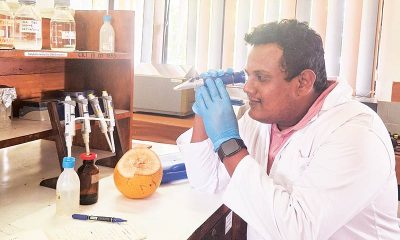
 Life style6 days ago
Life style6 days agoKing of coconuts heads for a golden future
-
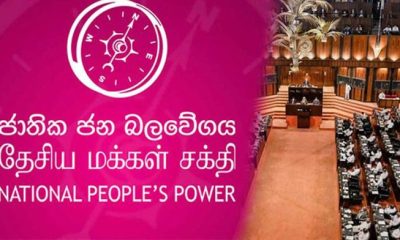
 News5 days ago
News5 days agoNPP appoints two defeated candidates as NL MPs
-
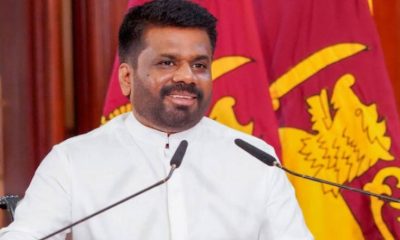
 News7 days ago
News7 days agoPresident warns his party: “We will fail if we view power as an entitlement to do as we please”
-
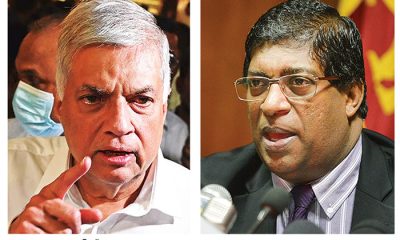
 News4 days ago
News4 days ago‘Gas Cylinder’ explodes; Ranil flays NDF Secy. for submitting Ravi’s name
-

 Midweek Review3 days ago
Midweek Review3 days ago‘Ramayanizing’ Sri Lanka by Courtesy of SriLankan Airlines
-
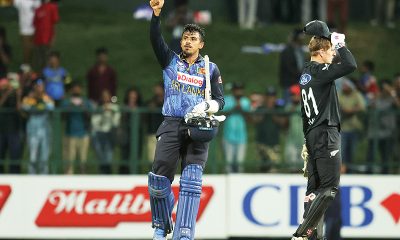
 Sports4 days ago
Sports4 days agoMaking batting compulsory for bowlers has worked – Theekshana
-

 Editorial7 days ago
Editorial7 days ago‘Maroon Wave’ and AKD Magic
-

 Editorial6 days ago
Editorial6 days ago‘Twas a great victory











